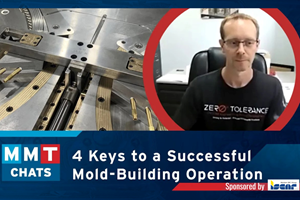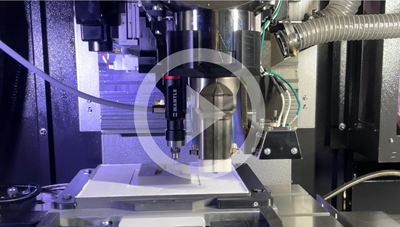Video: Mold Base for Product Development With 3D Printed Molds
Alba Enterprises created a mold base to match the needs and pacing of product iteration using mold tooling made via additive manufacturing.
Alba Enterprises LLC developed the mold base seen below and in the video above specifically with 3D printed mold tooling in mind. That is, steel mold tooling made additively, perhaps through laser powder bed fusion or through the Mantle TrueShape metal paste process. The chief benefit of making this tooling additively is in product development, Alba says. Tools capable of production molding can be made in lead times short enough for rapid iteration of the mold design and molding process. This video shows a mold base Alba created specifically for this mode of product development.

Video Transcript
How can the injection molding process adapt to help better realize the promise of 3D printed mold tooling? Look at this. This is a mold base set designed by Alba Enterprises. I'm here at their facility. This mold base is tailored to a mold sized to be two inches square. Why that size? Because Alba has discovered that at that size, the cooling of this mold base alone is sufficient to maintain the required temperature of the mold. That means no cooling lines are needed for the mold itself. That brings real freedom to the mold design. It enables 3D printed mold making, already a fast way to obtain a mold, to proceed even faster. That means: iterate quickly. Check the design. Check the process. Change the design. Change the process. Keep doing that within tight, fast, iterative loops, all using tooling and a process that can become, will become, the production process when the final solution is realized. This is the Babyplast miniature, precise injection molding machine that Alba Enterprises provides. Ten-ton mold clamping force. Alba has used this system to run 3D printed mold tooling made of laser powder bed fusion, made using the Mantle True Shape process, even polymer 3D printed molds in some cases. Another feature of this mold set this array of injector pin holes, always ensuring that there is a pin at the right location for these small injection molded parts made with 3D printed tooling.
More From This Author
Peter Zelinski reports on the advance of 3D printing for industrial production as editor-in-chief of Additive Manufacturing Media, a MoldMaking Technology sister brand. Find his work in Additive Manufacturing magazine, in The BuildUp newsletter, and on The Cool Parts Show, which he co-hosts. SUBSCRIBE HERE
Related Content
3D Printing Innovates Hot Runner Manifold Design
Metal 3D printing combined with a conventionally machined manifold block overcomes flow shadows on valve gates and offers faster color changes while providing closer system pitch centerlines between cavities.
Read MoreThe Connector Conundrum: 3D Printed Mold Tooling’s Role in Innovation
ReelView Fishing faced an electronics obstacle in the development of its new technology for underwater video. Additive manufacturing for moldmaking enabled the speed necessary to iterate to a solution.
Read MoreMMT Chats: 4 Keys to a Successful Mold-Building Operation: Innovation, Transparency, Accessibility and Relationship
MoldMaking Technology Editorial Director Christina Fuges chats with Steve Michon, co-owner of Zero Tolerance in Clinton Township, Michigan, about the excitement of solving problems, the benefits of showing gratitude, the real struggle with delegation and the importance of staying on top of technology. This episode is brought to you by ISCAR with New Ideas for Machining Intelligently.
Read MoreMMT Chats: The Connection Between Additive Manufacturing Education and ROI
This MMT Chat continues the conversation with Action Mold and Machining, as two members of the Additive Manufacturing team dig a little deeper into AM education, AM’s return on investment and the facility and equipment requirements to implement AM properly.
Read MoreRead Next
8 Ways the Plastics Industry Is Using 3D Printing
Plastics processors are finding applications for 3D printing around the plant and across the supply chain. Here are 8 examples.
Read More3D Printing Molds With Metal Paste: The Mantle Process Explained (Video)
Metal paste is the starting point for a process using 3D printing, CNC shaping and sintering to deliver precise H13 or P20 steel tooling for plastics injection molding. Peter Zelinski talks through the steps of the process in this video filmed with Mantle equipment.
Read MoreThe Connector Conundrum: 3D Printed Mold Tooling’s Role in Innovation
ReelView Fishing faced an electronics obstacle in the development of its new technology for underwater video. Additive manufacturing for moldmaking allowed for the speed necessary to iterate to a solution. How inventors and invention will benefit from new ways of obtaining production-ready tooling.
Read More



















